A prosecution witness in the trial of Nnamdi Kanu, the self-acclaimed leader of the proscribed Indigenous People of Biafra (IPOB), said on Wednesday that the defendant admitted smuggling a radio transmitter into the country.
The witness, an official of the Department of State Services (DSS), identified a video recording of DSS officials’ inspection of the transmitter in Ubuluisiuzor, Anambra State, allegedly used by Kanu for his Radio Biafra and which, the witness said, the defendant admitted smuggling into the country.
The video recording, stored in a disc, was one of about four video recordings admitted during Wednesday’s proceedings in which the DSS denied subjecting Kanu to duress and asking him to say things about ex-President Goodluck Jonathan and former Governor Rochas Okorocha.
At the commencement of proceedings, the DSS official, who was the third prosecution witness (PW3), while being led by prosecution lawyer, Adegboyega Awomolo (SAN), said he knew Kanu to be the leader of IPOB, a terrorist organisation.
The witness said he also knew Kanu as the founder of Radio Biafra, which he allegedly used to incite the public to maim and kill.
He said he first met Kanu on 21 October 21, 2015 when he and three others were asked to interview him and obtain his statements in relation to his activities as the founder of IPOB and Radio Biafra.
He said the interview sessions, which happened between October 21 and 24, 2015 were recorded on video with the consent of the defendant, who later wrote statements.
Defence lawyer, Kanu Agabi (SAN) did not object when Awomolo applied to tender the video recordings, which Justice James Omotosho subsequently admitted in evidence.
Agabi, however, objected when Awomolo applied to tender the written statements, noting that the defendant claimed he did not make them voluntarily, a claim Awomolo countered.
In view of the development, Justice Omotosho demanded that the defence specify what constituted the alleged involuntariness.
He then halted proceedings briefly to allow one of the lawyers to the defendant, Paul Erokoro (SAN) to interact with Kanu, who was seated in the dock, on the issue.
When Erokoro returned, he told the court that Kanu told him that DSS officials denied him access to his lawyer, threatened not to allow him on bail and denied him the one hour granted him daily to receive fresh air in view of his health challenge.
The lawyer said Kanu also told him that his interrogators asked him to say things about ex-President Goodluck Jonathan and former Imo State Governor, Rochas Okorocha, which were not his words.
At that point, Justice Omotosho ordered the conduct of a trial within a trial to ascertain the voluntariness or others of the defendant’s statements.
Awomolo then called PW3 as the prosecution’s first witness in the trial. The witness denied that Kanu was subjected to any form of duress or coercion.
The witness faulted Kanu’s claim that he was kept in solitary confinement in an underground cell and that he suffered from any ill.
PW3, who said Kanu was given preferential treatment and served bottled water during the interview sessions, said he was surprised to hear the allegations made by the defendant.
He also denied that anyone asked Kanu to say things about Jonathan and Okorocha, adding that the defendant “spoke voluntarily and truthfully in the interviews.”
The DSS officials said the defendant was referring to their interactions over the interview he (Kanu) earlier granted to Sahara Reporters and in respect of which they asked for some clarifications.
He said, “During the October 24, 2015, interview, the Sahara Reporters interview was played to him to confirm if he granted the interview, which he confirmed.”
The witness added that in the Sahara Reporter interview, Kanu referred to Nigeria as a zoo; he claimed that Okorocha and others have Islamised Nigeria. He added that Kanu referred to the then President Muhammadu Buhari “in a very derogatory language.”

